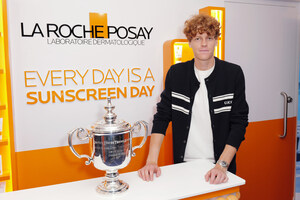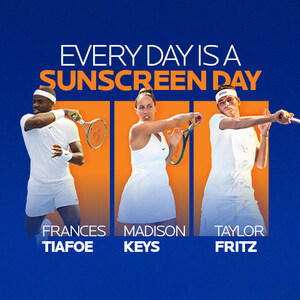La Roche-Posay and the Women's Dermatologic Society (WDS) Join Forces on a Mission to Change Sunscreen Habits for the Skin of Color Population(1)
Backed by Science, the La Roche-Posay SOS--Save Our Skin Program and the WDS--Play Safe in The Sun Program are leading the charge to increase sun safe behavior for all ethnicities
NEW YORK, May 29, 2014 /PRNewswire/ -- Skin cancer might not seem like a significant health threat for those with darker skin tones, but according to recent studies, it should be. One out of five Americans will get skin cancer2, and although melanoma incidence is higher in Caucasians, the 5-year survival rates for African Americans (78%) are significantly lower than that of Caucasians (92%)3. This is due to the common misconception that protection from the sun is not necessary for those with darker skin tones. As a result, people of color are more likely to wait until the disease has reached an advanced stage to visit the dermatologist, or worse, don't visit the dermatologist at all.
Compliance tends to be an issue among all sunscreen users. In fact, 51% of Americans don't use sunscreen due to texture4. La Roche-Posay, a leader in UV protection research, and the Women's Dermatologic Society, the third largest Dermatologic society, have decided to take a stand on this rising epidemic by not just raising awareness, but encouraging true behavioral change through educating on two key motivators: 1) Sunscreen can make your skin more healthy and beautiful5, and 2) Sunscreens don't have to feel greasy or leave a chalky finish.
This approach came about due to a recent groundbreaking study that showed daily sunscreen use can improve the overall quality of skin for all skin tones. In fact, 90% of Hispanics showed an improvement in the intensity of dark spots, and 64% of those with skin of color showed an improvement in the number of dark spots6. As there has been little research on this subject, the study was recently presented at the annual American Academy of Dermatology meeting and recognized as an award-winning study by the Skin of Color Symposium in Denver earlier this year.
"As the pioneers in creating innovative and wearable sunscreen textures that are effective and safe for sensitive skin, we're pleased that our award-winning La Roche-Posay Anthelios 60 Ultra Light Sunscreen Fluid demonstrated improved skin tone evenness along with brightening of skin of color with daily use of in just 8 weeks,7" says Angela Bennett, VP of La Roche-Posay. We hope that our work with the WDS will result in increased sunscreen use for all ethnicities."
The La Roche-Posay SOS – Save Our Skin initiative that supports the Women's Dermatologic Society's ongoing Play Safe in the Sun campaign decided to take the program nationwide this year to change the way this demographic thinks about sunscreen use. Throughout 2014, this volunteer program will spread awareness about the benefits of sunscreen at key events across the country targeting the ethnic skin audience at various sporting events, breast cancer walks, urban family festivals, and WDS member-driven grassroots activities where free skin cancer screenings and sunscreen samples will be offered. Events include:
- LPGA Kraft Nabisco Championship Tournament (Rancho Mirage, CA)
- Sister's Network 5th Annual National African American Breast Cancer 5K Walk/Run (Houston, TX)
- Susan B. Komen Race for the Cure (St. Louis, MO)
- LPGA International Crown (Owings Mills, MD)
- Rock N'Roll Marathon (Philadelphia, PA)
- Congressional Black Caucus Foundation – Annual Conference (Washington, DC)
- Susan B. Komen Race for the Cure (New York, NY)
"As the new president of the WDS, it's so important that we are all properly educated about the risks of sun exposure and proper sunscreen use," says Valerie Callender, MD, WDS president. "This is particularly important since the U.S. population is rapidly changing. By the year 2050, more than half of our country's population will be comprised of ethnic minorities8. Daily sunscreen use is clinically proven to not only help in the prevention of skin cancer, but also improves the overall health and quality of skin."
For a list of all related events and dates, please go to www.womensderm.org or www.sossaveourskin.com.
For those unable to attend these events, materials showing the motivating clinical skin improvement of daily sunscreen use will be handed out at 1,500+ drugstores nationwide by local beauty advisors.
About WDS
The Women's Dermatologic Society, founded in 1973, is dedicated to helping dermatologists fulfill their greatest potential and assisting them in making a contribution to the specialty and society. To achieve this goal, the Society relies on the active participation of its members, who represent a diverse cross-section of professional subspecialties. The mission of the Women's Dermatologic Society is to support dermatologists by striving to: promote leadership and the development of relationships through mentoring and networking; demonstrate a commitment to service through community outreach and volunteerism; provide a forum for communications and research relevant to women's and family issues; advocate excellence in patient care and education, and promote the highest ethical standards.
About LA ROCHE-POSAY
Recommended by more than 25,000 dermatologists worldwide, La Roche-Posay offers a unique range of daily skincare developed with dermatologists to meet their standards in efficacy, tolerance and elegant textures for increased compliance. The products, which are developed using a strict formulation charter, include a minimal number of ingredients to reduce side effects and reactivity and are formulated with active ingredients at optimal concentrations for increased efficacy. Additionally, La Roche-Posay products undergo stringent clinical testing to guarantee efficacy and safety, even on sensitive skin.
For additional information about La Roche-Posay, visit www.laroche-posay.us and "like" the La Roche-Posay Facebook page at www.facebook.com/LaRochePosayusa.
About SOS – Save Our Skin
Now in its fifth year, La Roche-Posay continues its SOS – Save Our Skin to not only inform Americans about the dangers of UV rays and the importance of sun safety, but to also encourage true behavioral change, such as incorporating sun protection in their daily routines and visiting their dermatologists for regular skin checks. In partnership with the Women's Dermatologic Society (WDS), the SOS – Save Our Skin campaign lives through a series of initiatives, including skin checks at sporting events, local hospitals and drug stores as well as free skin checks offered to all L'Oreal corporate employees. To learn how to do a self-check and choose the right protection, visit www.sossaveourskin.com.
1 Including Latinos, African Americans, and all individuals with darker skin tones
2 American Academy of Dermatology
3 Wu XC, et al. Racial and ethnic variations in incidence and survival of cutaneous melanoma in the United States, 1999-2006. J Am Acad Dermatol 2011;65:S26-37
4 La Roche-Posay Study: Data on File
5 La Roche-Posay Study: Data on File
6 La Roche-Posay Study: Data on File
7 La Roche-Posay Study: Data on file
8 US Census Bureau
Logo - http://photos.prnewswire.com/prnh/20140528/91989
SOURCE La Roche-Posay
WANT YOUR COMPANY'S NEWS FEATURED ON PRNEWSWIRE.COM?
Newsrooms &
Influencers
Digital Media
Outlets
Journalists
Opted In






Share this article